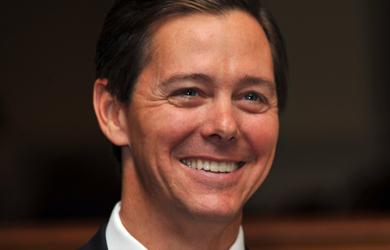When it was first reported last month that Ralph Reed was forming a new organization called The Faith and Freedom Coalition, Reed wanted it made clear that “this is not your daddy’s Christian Coalition.”
He vowed that this effort would be “more brown, more black, more female, and younger” and all-around hipper with a greater focus on using “third wave” technology to mobilize activists.
In shot, Reed sees himself as the Steve Jobs of the Religious Right, called in to turn around the movement that floundered after he left:
The party needs what he delivered in the 1990s, but with a 21st century update.
“Even though I’ve been doing other things, this is kind of like Steve Jobs returning to Apple,” Reed said.
When Jobs left the company he founded, Apple foundered. After he returned, Apple grew into an iconic firm that has captured the public’s attention in ways that all other tech firms wish to emulate.
“You have to reinvent it,” Reed said. “It’s the political analogue to the iPod and the iPhone. It would be cool. It would be transformative. It would transform our politics and bring younger people to our ranks. All of those are critical imperatives.”
…
[T]he Faith and Freedom Coalition was not, he said, his idea. After John McCain was beaten in 2008, Reed said, he started getting phone calls from close friends, “saying we really haven’t had anything that in an effective, focused way was energizing and turning out to the polls in large numbers conservatives and people of faith since you left” … Still, Reed said, he wasn’t terribly interested.
“That was not on my list of things to do,” he said. “I’d been there, done that, got the T-shirt.”
But the more he thought about it, the more he agreed that “something needed to be done.”
Where the old Christian Coalition’s greatest asset was arguably the millions of voter guides handed out in churches across the country, the new Coalition will use the Internet as its information dissemination tool.
Attracting younger voters and activists, Reed knows, takes a robust Web-based campaign that uses the new gadgets and social networks that dominate young people’s lives.
But it also takes a hook, a rallying cry, a reason for being. In the 1990s, the Christian Coalition had that and more in the persona and presidency of Bill Clinton.
While Obama has not offered the same wedge that Clinton did —- no sex scandals, for example —- Reed is confident the lightning rod is there.
“This is the most far-reaching and extremist agenda being advanced across multiple fronts in a smaller amount of time than I’ve seen in my career,” Reed said.
From the very moment this effort was announced, it was Reed’s name that made it news … but now Reed is insisting that it is really not about him at all:
Still, Reed said, this is not about him. And it’s not a comeback or a return to prominence.
“I don’t think it signifies anything for me,” Reed said. “I’ve become an elder statesman at 48, but I’m still doing what I was doing at 20.”
Reed said he’s less interested in being “the face of the movement,” and more in finding and training the next generation of conservative leaders, volunteers and activists.
Of course, if Reed is trying to stay out of the limelight, it might be helpful is he wasn’t granting interviews in which he compares himself to Steve Jobs and declares that he is the only one capable of rebuilding the movement.
But it makes sense that Reed would not want to be “the face of the movement” given that he is inextricably linked [PDF] to imprisoned lobbyist Jack Abramoff.
It’s going to take some deft maneuvering for the man who exploited the Religious Right movement he helped to create for the benefit of Abramoff’s client’s gambling interests to now resurrect that very movement.







